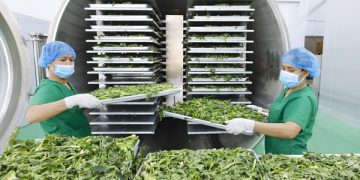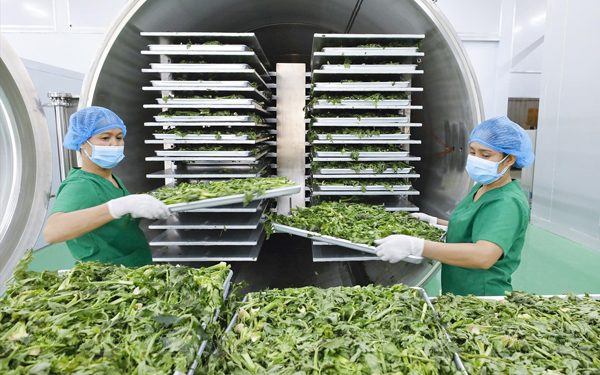Vietnam’s vegetable processing industry holds significant promise, yet it faces critical hurdles hindering its full potential. According to the Ministry of Agriculture and Rural Development, a staggering 76% of exported vegetables are primarily in fresh or minimally processed forms. This stands in stark contrast to the evolving global dietary preferences, particularly in Europe, where processed vegetables are increasingly favored. Consequently, Vietnam’s vegetable export volume remains relatively low.
Presently, the country boasts 157 modern vegetable processing plants with a designed capacity of 1.1 million tons per year. However, many of these facilities operate at only 50-60% capacity due to various factors, including unstable raw material sources. Notably, the decentralized and fragmented nature of vegetable production leads to inconsistencies in quality and supply. Additionally, the lack of advanced machinery, technology, and infrastructure further exacerbates the industry’s challenges.
Furthermore, most processing enterprises in Vietnam are small-scale, with over 80% having capital of less than 2 billion VND. Consequently, access to investment capital is limited, impeding the adoption of modern processing technologies and practices. Moreover, inadequate post-harvest infrastructure and storage facilities contribute to significant post-harvest losses, exceeding 20%.
Despite these challenges, the transformation of Vietnam’s vegetable processing industry holds immense promise. Not only does processing help control costs, but it also multiplies the value of agricultural commodities by 3 to 4 times compared to fresh produce. Additionally, processing extends the shelf life of vegetables, addressing supply surplus issues and reducing post-harvest losses.
To unlock this potential, substantial investment is required. However, securing funding remains a major challenge, particularly for small and medium enterprises. Moreover, a lack of emphasis on post-harvest management by farmers exacerbates losses, limiting the industry’s growth.
Looking ahead, diversifying into processed vegetable products presents a compelling opportunity for Vietnam to expand its presence in international markets. By addressing these critical issues, Vietnam can emerge as a leading exporter of processed vegetable products, driving economic growth and sustainability in the agricultural sector.
The vegetable processing sector in Vietnam stands at a crucial crossroads, with immense potential waiting to be unlocked. By addressing key challenges such as investment constraints, post-harvest losses, and technological adoption, Vietnam can position itself as a global player in the processed vegetable market. With concerted efforts from policymakers, industry stakeholders, and farmers, Vietnam can chart a path towards sustainable growth and competitiveness in the vegetable processing industry.































